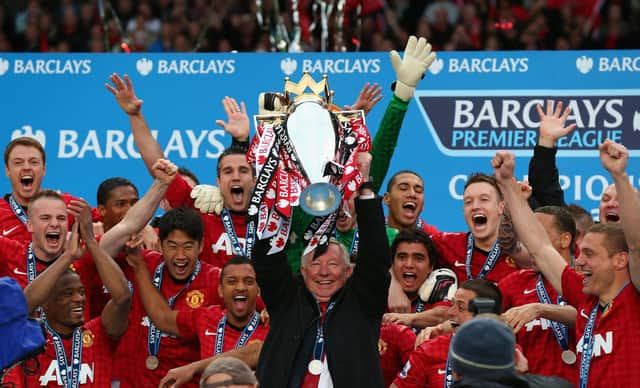How Alex Ferguson and football in general have changed the English language – Susie Dent


It comes straight from the lexicon of former Arsenal manager Arsène Wenger, who instinctively reinvented the English language in his post-match comments by borrowing phrases from his native French and German, also bequeathing us the adverb “footballistically”.
Neither of these particular donations have made into the dictionary – yet – but this week the Oxford English Dictionary (OED) included in its quarterly update other donations from the beautiful game, including Sir Alex Ferguson’s “squeaky bum time” and José Mourinho’s “park the bus”.
Advertisement
Hide AdAdvertisement
Hide AdThe inclusion in the OED is significant – unlike strictly current dictionaries, which include new words that are bubbling under as well as those that have broken decisively through the surface, the Oxford English Dictionary is the grand dame of all lexicons, charting the shifting meanings of our words from their beginnings right up to the present day.
Once a word enters its pages – virtual or otherwise – it will never go out, which means that the process for including any new coinage is rigorous and considered. The fact that these footballing neologisms have been included means they have shrugged off any fly-by-night status and are here for the duration.
It’s unsurprising, of course, that the game is a prominent influence on the way we speak. This is the sport that, as Bill Shankly famously put it, is more important than life and death, inspiring near-unparalleled levels of devotion.
“I’m off to the temple” was the early 20th-century fan’s way of saying they were going to the match at their team’s home ground, displaying a reverence that neatly bears out the etymology of the word “fan”.
For the Romans, fanaticus meant “belonging to the temple” and, by extension, “inspired by a god”. The term soon encompassed the frantic and manic behaviour of someone possessed by a spirit or demon. Were a Roman to witness the modern supporter’s screaming, stripping, and swearing, they might well put it down to a demon. (It so happens that “profanity” is also linked to the temple – this time meaning “outside it”, ie not sacred.)
From such fanaticism grows a tribal lexicon, a shorthand that unites those who belong and excludes those who don’t. Whether you’re shouting about a belter/pearler/zinger/thronker/screamer of a shot, a daisy-cutter, or a ping into the top bin, any new word or expression can travel at the speed of an Erling Haaland bicycle kick.
In the late 1990s, papers were suddenly full of references to “the hairdryer treatment”, another legacy of Sir Alex, thanks this time to the apparent heat and face-to-face proximity of his post-match temper flares.
Today, no matter how nonsensical the metaphors or insulting the idiom, bigging up is the name of the game. All refs are blind, any bad marking creates a space so big you can drive a bus through it, and every match is a game of two halves.
Advertisement
Hide AdAdvertisement
Hide AdBut there was once creativity in the clichés too. To be as “sick as a parrot”, recorded since the 1970s, may have a link with a real and nasty parrot disease called psittacosis (a relative of the highly useful “psittacism”: the mechanical repetition of other people’s words).
We have been “over the moon”, meanwhile, since the 18th century, which has magical beginnings in the nursery rhyme “Hey Diddle Diddle, the Cat and the Fiddle”. Anyone suffering the humiliation of a “nutmeg” might just find a smile in the term’s origins as slang for the testicles.
The picture continues to evolve. This is a language in which “quality” and “class” are the adjectives of choice, where players’ names are continuously pluralised (your “Messis” and your “Grealishes”), where “them” replaces “those” and “y’knows” are liberally sprinkled through conversation.
Such new tropes eventually become staples of our tribal talk, ones that often slip into the mainstream. The “football” tense, used especially when a player is replaying a “situation” in their heads – “The ball’s come across; I’ve gone to hit it, but it’s come off my shin and . . .” – is now everywhere. Wenger’s contributions aside, our modern aversion to adverbs surely began on the football pitch, where a player has always “done good” or “come away too quick”.
At the end of the day, you couldn’t make it up – except we do, week after week, as we climb the terraces or shout at our TV screens. Football language is one that is endlessly replayed and renewed and that binds its collective speakers together as one, no matter who we support.
Not that we should take it all too seriously. As an individual named simply “Joey” put it in a now-famous “letter to the Editor” in Viz: “I’m sick of sports commentators saying ‘you couldn’t write a script like this’. If people can write scripts about dystopian futures in which life is in fact a simulation made by sentient machines to harness humans’ heat and electricity as an energy source, they can probably write ones about Gary Taylor-Fletcher scoring a last-minute equalizer against Stoke.”
Footballistically speaking, that’s straight in the back of the net.
Susie Dent is a lexicographer and etymologist. She has appeared in ‘Dictionary Corner’ on Countdown since 1992, and co-hosts with Gyles Brandreth the podcast Something Rhymes with Purple.
Comments
Want to join the conversation? Please or to comment on this article.
